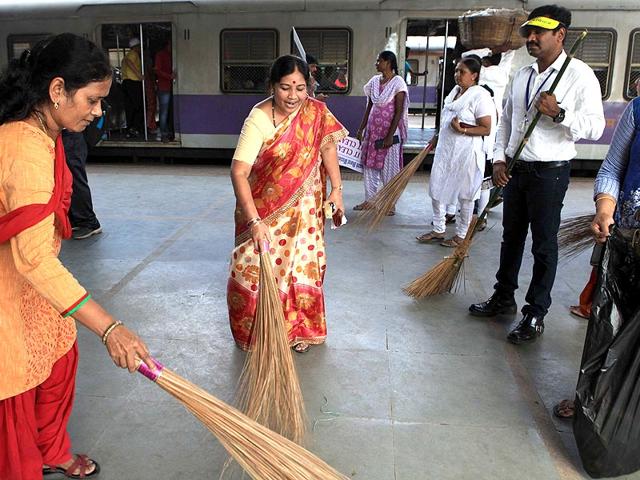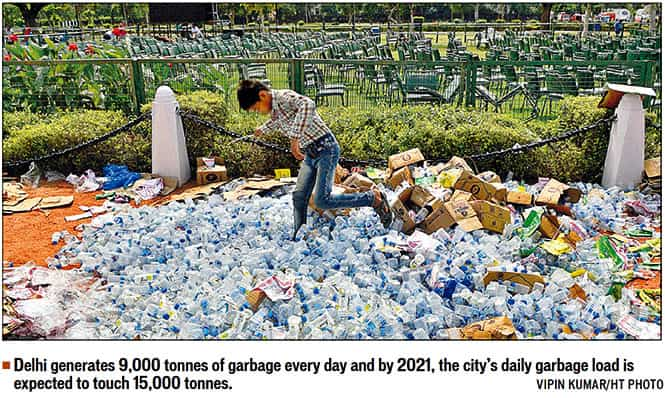Clean India campaign is Delhi’s best chance to make waste recycling compulsory
With rising incomes, Delhiites are not only consuming more. They are also discarding more. The city generates 9,000 tonnes of garbage every day and the 2,500-odd community bins are already overflowing. By 2021, the city’s daily garbage load will touch 15,000 tonnes.
Mundane civic issues like cleanliness in public spaces rarely go national. So it was heartening to have the Prime Minister launch the Swachh Bharat Abhiyan on Mahatma Gandhi’s birth anniversary last week.

In Delhi, the launch of the campaign saw everyone from cabinet ministers to sundry politicians, bureaucrats to clerks and top cops to the constabulary wielding brooms at their workplaces. For many, it was a good photo op. Others were probably there because the attendance was mandatory.
Cynicism aside, the much-televised campaign has made cleanliness a talking point. The social media is full of high-pitched debates on how to keep our cities clean. The public awareness campaigns of Kooda Kumar and Su Su Kumar telling people not to litter and urinate in the open are back on the billboards. Even the otherwise inert civic agencies have launched an extended drive to clean the streets, drains, public toilets and parks across Delhi.

These are all good signs but we wished the sanitation drive was a little more than a spring cleaning exercise. Picking waste from our immediate surroundings would certainly help in the short term. But how long would these places stay clean? And in the absence of a waste management plan, wouldn’t we just pile up the waste somewhere else?
With rising incomes, Delhiites are not only consuming more. They are also discarding more. The city generates 9,000 tonnes of garbage every day and the 2,500-odd community bins are already overflowing. By 2021, the city’s daily garbage load will touch 15,000 tonnes.
Delhi would need an additional area of 28 sq km to accommodate this mountain of waste. This is more than the entire spread of the Lutyens’ Bungalow Zone. The existing landfills on the city’s borders are experiencing landslides due to vertical growth. Ghazipur is packed to capacity but it continues to receive garbage. Moving to alternative sites has environmental issues and nobody wants the city’s waste in their backyard. Soon, we may not have any space to dump our garbage.
The ongoing Clean India drive should have come with a plan to reduce the quantity of waste going into the landfills. Recycling and composting of biodegradable garbage is the best way to do it but our civic bodies have no clear strategy yet.
So now, stuffing everything from kitchen rubbish to plastic, metallic packing, glass, batteries, CFL bulbs, and even sanitary waste, we hand over our garbage bags to sweepers who transport them to the local community bin after segregating bits they can sell to kabadiwallahs. From here, truckloads are transported to Delhi’s four landfills where waste-pickers collect what their counterparts in the streets may have missed earlier.
Experts say that over 50% of Delhi’s waste is fit for composting, 30% is recyclable and the remaining 20% should reach landfills. But with no formal process of segregation in place, dumping sites receive almost the entire load. Segregation at source by residents will work only if the corporations ensure an effective waste collection system and trash pickups have separate containers for dry and wet waste. But so far, only 15% Delhi has formal door-to-door garbage collection.
The law to make segregation of waste mandatory for each household has been in the works since the early 2000s. From 2003-06, the Municipal Corporation of Delhi held workshops to convince citizens. When that didn’t work, it sent a Bill stipulating fines to the Delhi government for approval. Since 2009, the Bill kept shuttling between the government and the corporations. Currently, the rules of Management of Solid Waste are under revision by the Union environment ministry.
With the PM’s mandate, the civic agencies should now push for laws making recycling mandatory for residents. Also, it may not be too late for the government to learn from our rag-pickers, who have been informally doing what is essentially the job of citizens and the municipal staff. Clean India is a great opportunity to safeguard them against health hazards and include them in an institutional framework of garbage management.




